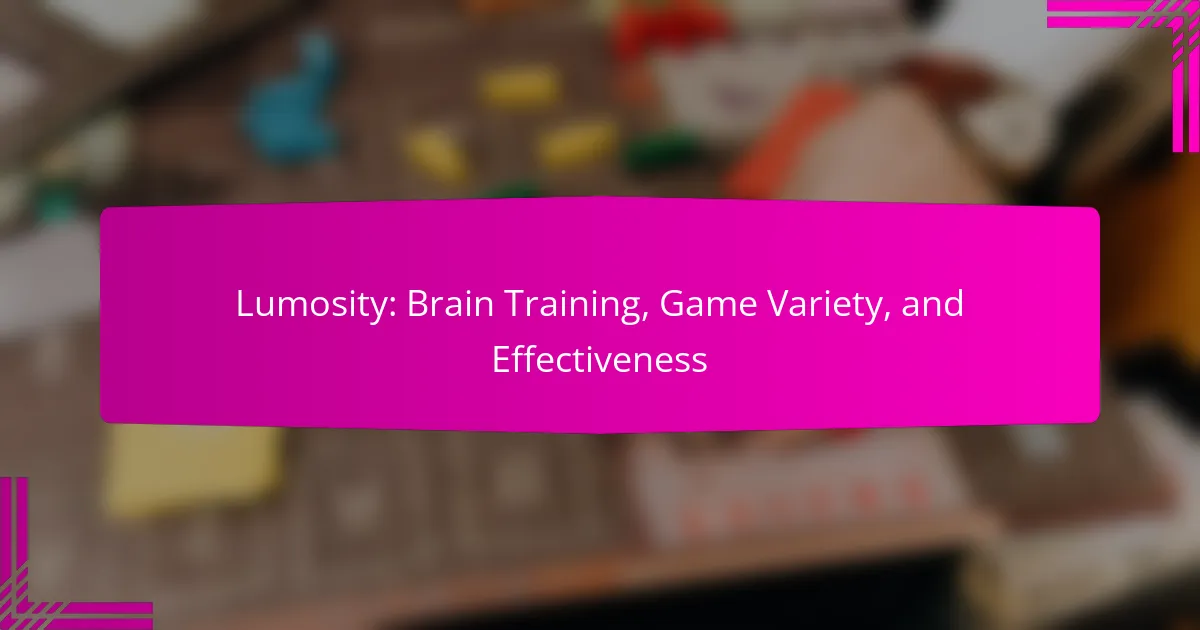Lumosity offers a unique approach to brain training through a variety of games aimed at enhancing cognitive skills. The platform focuses on memory, attention, and problem-solving while providing personalized training programs. Research suggests that regular engagement can lead to cognitive improvements, although effectiveness varies among individuals. This article explores Lumosity’s game variety, its effectiveness for cognitive enhancement, and best practices for users to maximize their training experience.
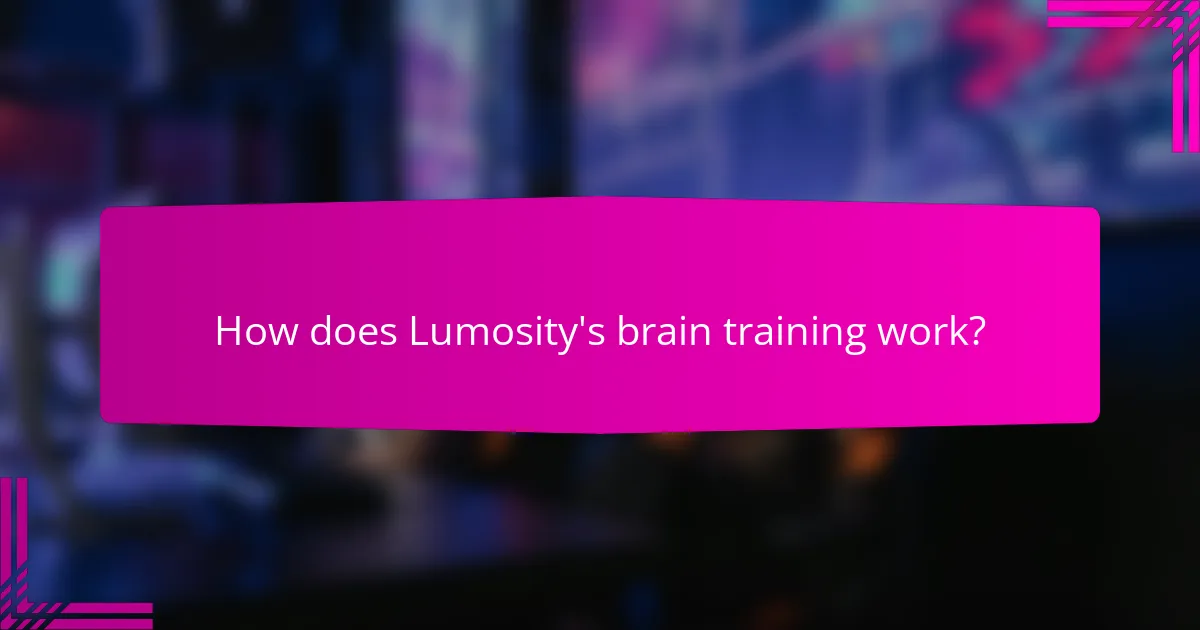
How does Lumosity’s brain training work?
Lumosity’s brain training works by offering a variety of games designed to enhance cognitive skills. These games target areas such as memory, attention, and problem-solving. Users engage in personalized training programs that adapt to their performance, ensuring an effective learning experience. Research indicates that regular use can lead to improvements in cognitive function, making it a valuable tool for mental fitness.
What types of cognitive skills does Lumosity target?
Lumosity targets various cognitive skills, including memory, attention, problem-solving, flexibility, and speed of processing. These skills are developed through a diverse range of games designed to challenge and enhance mental abilities. Memory training focuses on short-term recall, while attention games improve concentration and focus. Problem-solving exercises promote critical thinking, and flexibility tasks help in adapting to new information. Speed games enhance reaction time and processing speed, contributing to overall cognitive improvement.
How are games designed to enhance brain function?
Games like Lumosity enhance brain function through cognitive training that targets memory, attention, and problem-solving skills. These games provide a variety of challenges designed to stimulate different areas of the brain, promoting neuroplasticity. Research indicates that consistent engagement with such games can lead to measurable improvements in cognitive abilities. Importantly, the effectiveness of these brain training games varies based on individual usage patterns and the specific skills being targeted.

What is the variety of games offered by Lumosity?
Lumosity offers a diverse range of brain training games focusing on various cognitive skills. The games include categories such as memory, attention, problem-solving, flexibility, and speed. Each game is designed to challenge and improve specific mental abilities. Users can engage in personalized training programs based on their performance and preferences. This variety ensures that players remain engaged while targeting different aspects of cognitive function.
Which game categories are most popular among users?
Puzzle games, memory games, and attention training games are among the most popular categories in Lumosity. These categories engage users by challenging cognitive skills like problem-solving, recall, and focus. Puzzle games enhance logical thinking, while memory games improve retention abilities. Attention training games help users refine their concentration, making them essential for effective brain training.
How often does Lumosity update its game offerings?
Lumosity updates its game offerings regularly, typically adding new games and features every few months. This ensures a fresh experience for users and enhances the effectiveness of brain training. The platform also rotates existing games to keep the content engaging.
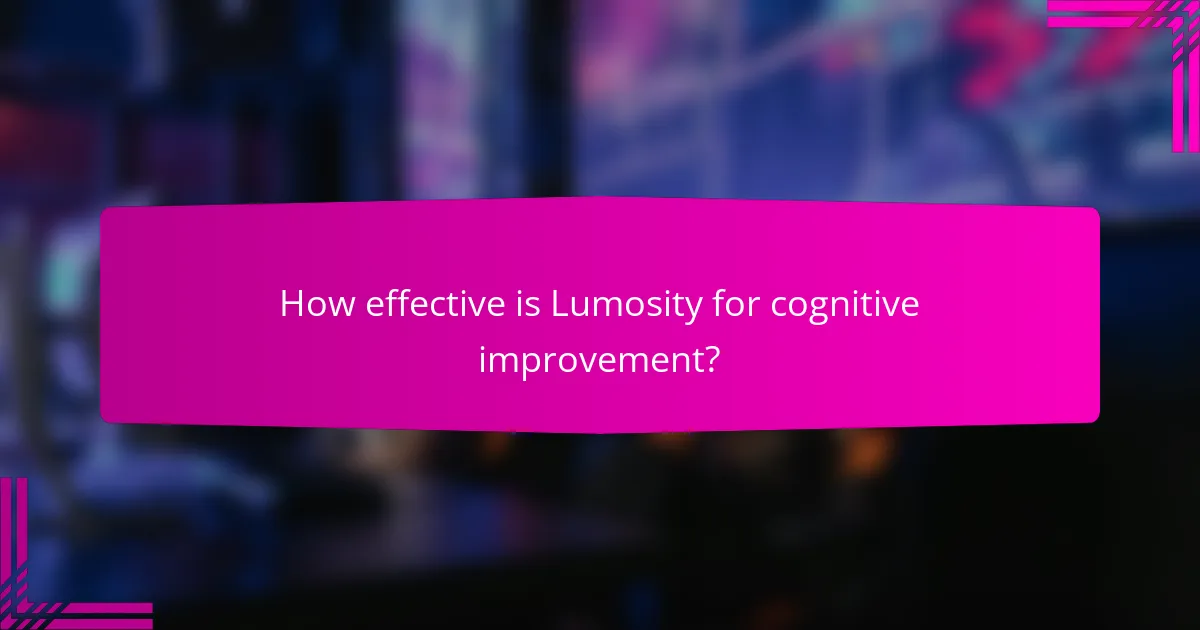
How effective is Lumosity for cognitive improvement?
Lumosity can be effective for cognitive improvement, but results vary by individual. Research shows mixed outcomes regarding its impact on general cognitive abilities. Some studies indicate modest improvements in specific skills, while others find little to no significant change. The game variety in Lumosity targets various cognitive domains, including memory, attention, and problem-solving. However, relying solely on brain training games may not yield comprehensive cognitive enhancement. Engaging in diverse mental challenges and real-world activities is essential for optimal cognitive development.
What scientific research supports Lumosity’s claims?
Research supports Lumosity’s claims through various studies demonstrating cognitive improvements. A meta-analysis published in 2016 found that brain training games can enhance specific cognitive skills, such as memory and attention. Another study indicated that participants who engaged in Lumosity’s training showed better performance in tasks requiring problem-solving skills. Furthermore, research conducted by the University of California, San Francisco, highlighted improvements in cognitive flexibility among users. These studies collectively affirm Lumosity’s effectiveness in enhancing cognitive functions.
How do user testimonials reflect on effectiveness?
User testimonials indicate that Lumosity is effective for brain training. Many users report improved cognitive abilities and enhanced memory after regular use. These testimonials highlight the game’s variety, which keeps users engaged and motivated. Additionally, positive feedback on specific exercises suggests that certain games are particularly beneficial for critical thinking and problem-solving skills. Overall, user experiences support Lumosity’s effectiveness in brain training.
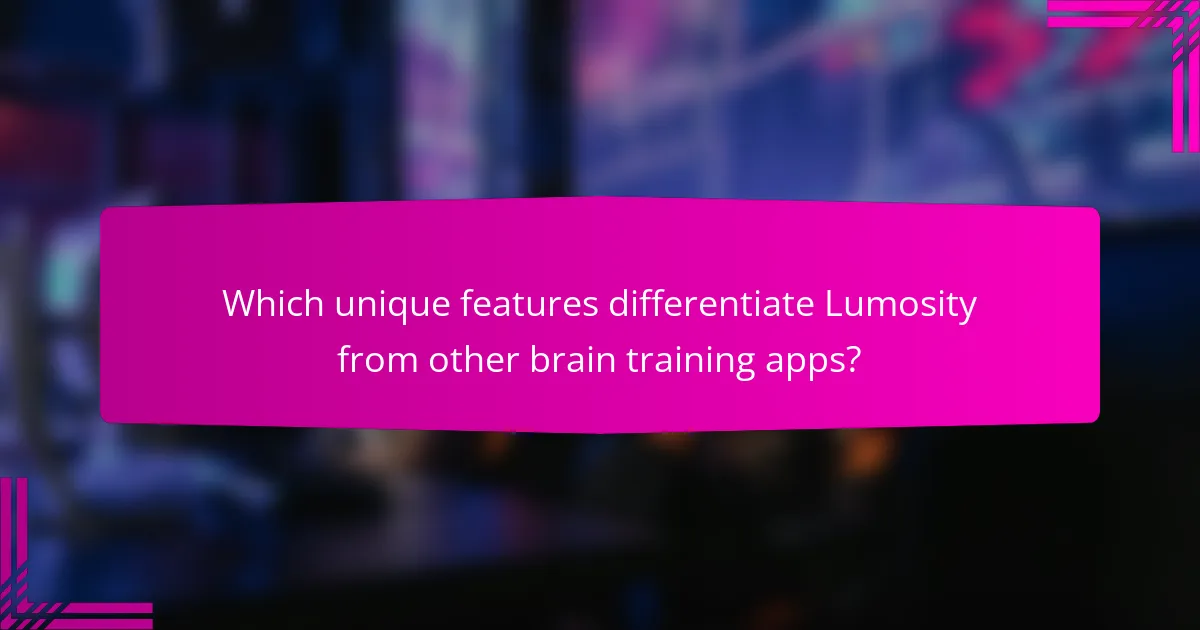
Which unique features differentiate Lumosity from other brain training apps?
Lumosity stands out from other brain training apps due to its scientifically designed games, personalized training programs, and extensive research backing its effectiveness. Unique features include adaptive difficulty levels that adjust to user performance, a diverse range of cognitive skills targeted, and a robust tracking system that monitors progress over time. Additionally, Lumosity collaborates with neuroscientists to ensure its games are not only engaging but also beneficial for cognitive enhancement.
How does personalized training adapt to individual user needs?
Personalized training adapts to individual user needs by tailoring exercises based on cognitive strengths and weaknesses. Lumosity uses user data to customize game recommendations, ensuring engagement and effectiveness. This approach enhances user experience by focusing on specific areas for improvement, such as memory or attention. Adaptive algorithms analyze performance metrics to adjust difficulty levels, providing a unique training pathway for each user.
What role do progress tracking and analytics play in user engagement?
Progress tracking and analytics significantly enhance user engagement in Lumosity by providing personalized insights. These tools help users monitor their cognitive performance over time, creating a sense of achievement. As a result, users are more likely to stay committed to their brain training routines. Progress metrics, such as scores and improvement rates, motivate continued participation, making the training experience more effective.
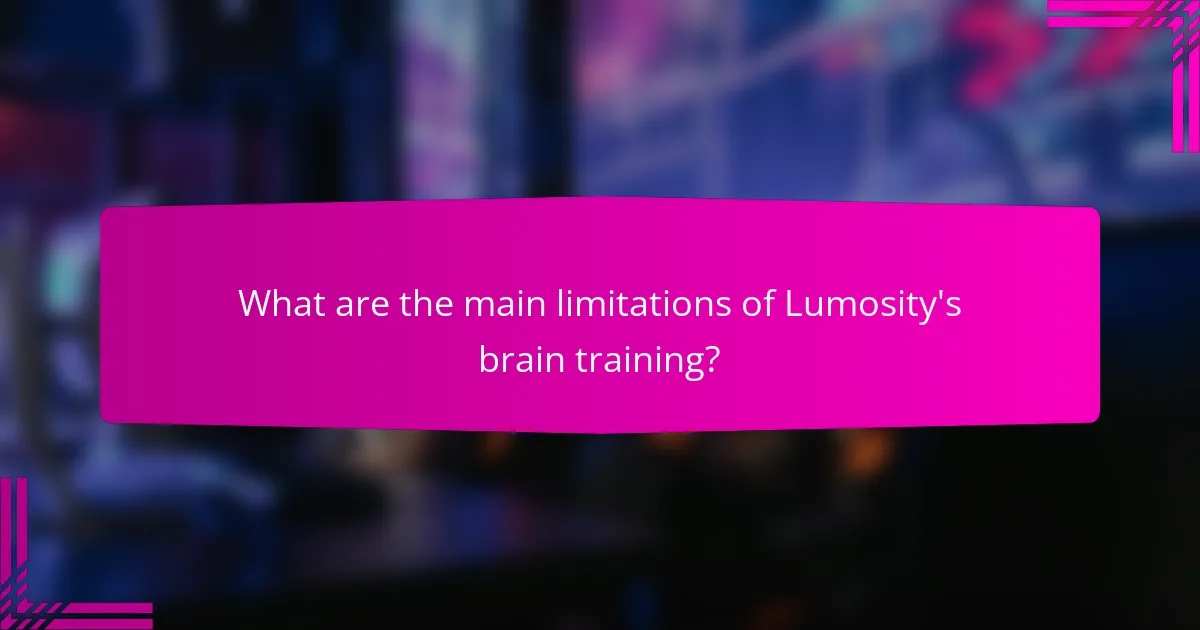
What are the main limitations of Lumosity’s brain training?
Lumosity’s brain training has several limitations. The effectiveness of its games in improving cognitive function is debated among researchers. Many studies suggest limited long-term benefits beyond game performance. Additionally, the variety of games may not cater to all cognitive skills equally, potentially leaving gaps in training. Users may also experience diminishing returns as they become familiar with the games, reducing their challenge and engagement. Lastly, the subscription model may deter some users from fully exploring the platform’s offerings.
What criticisms have been raised about the efficacy of cognitive training?
Critics argue that cognitive training, including Lumosity, lacks substantial evidence for long-term efficacy. Studies show mixed results, with some users reporting minimal improvement in real-world cognitive tasks. Concerns include the reliance on self-reported data and the potential for placebo effects. Additionally, the effectiveness may vary based on individual differences in cognitive abilities and training engagement.
How does Lumosity address concerns regarding user data privacy?
Lumosity prioritizes user data privacy through robust security measures and transparent policies. The platform employs encryption to protect personal information and offers users clear insights into data usage. Users can control their privacy settings, including data sharing preferences. Regular audits ensure compliance with privacy regulations, reinforcing user trust.
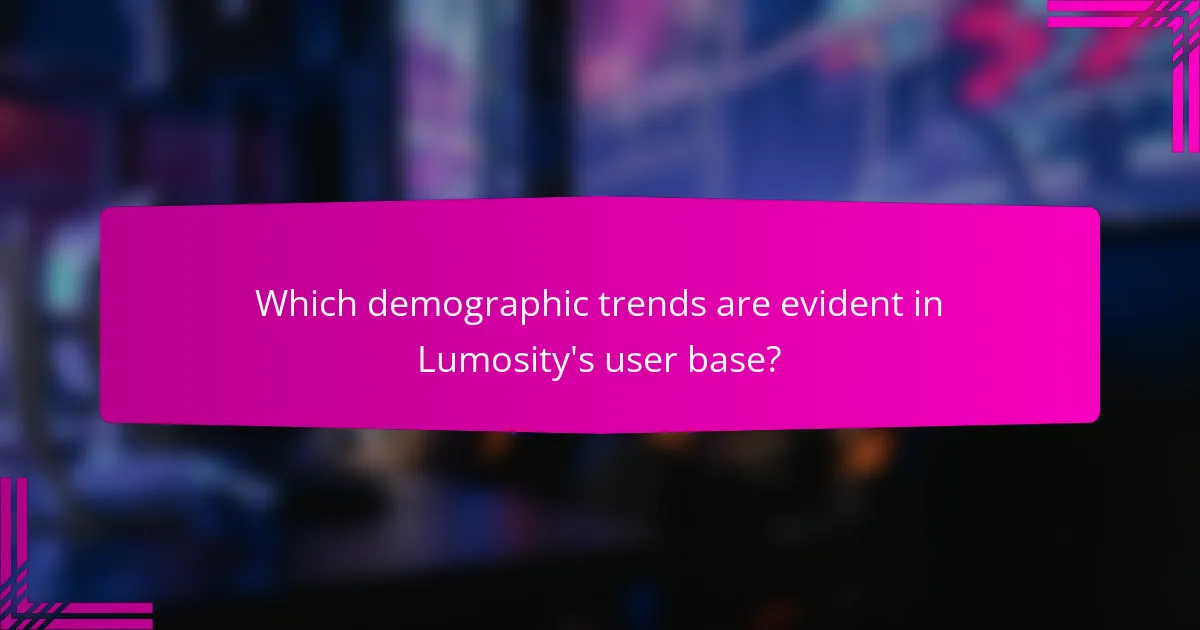
Which demographic trends are evident in Lumosity’s user base?
Lumosity’s user base shows significant trends in age and education level. The majority of users are aged 25-45, with a focus on individuals seeking cognitive enhancement. Additionally, a large portion holds at least a bachelor’s degree, indicating a trend towards educated professionals utilizing brain training for improved performance.
How do usage patterns differ across age groups?
Usage patterns for Lumosity differ significantly across age groups. Younger users often engage with the platform more frequently, driven by curiosity and a desire for cognitive improvement. In contrast, older users tend to focus on specific games aimed at memory and attention, utilizing the platform to maintain cognitive function. Research indicates that younger users show a preference for diverse game types, while older adults favor targeted training. This indicates a unique attribute of user engagement based on age, emphasizing tailored approaches for effective brain training.
What cultural factors influence the adoption of brain training apps?
Cultural factors significantly influence the adoption of brain training apps like Lumosity. Societal attitudes towards mental fitness and technology adoption play crucial roles.
In cultures that prioritize education and cognitive enhancement, users are more likely to embrace brain training apps. For instance, countries with high literacy rates often show greater engagement with such technologies.
Additionally, the perception of gamification in learning impacts usage. Cultures that value play as a learning tool tend to adopt these apps more readily.
Moreover, social influences, such as peer recommendations and community norms, can drive app adoption. If influential figures endorse brain training, it can enhance credibility and attract users.

What best practices can enhance the effectiveness of Lumosity training?
To enhance the effectiveness of Lumosity training, users should follow specific best practices. Regularly engaging with a variety of games boosts cognitive skills. Setting achievable goals helps maintain motivation and track progress. Consistent practice, ideally daily, reinforces learning. Additionally, taking breaks prevents mental fatigue and improves overall performance. Finally, integrating feedback from performance metrics can guide targeted improvement.
How can users set realistic goals for their brain training journey?
Users can set realistic goals for their brain training journey by focusing on specific, measurable objectives. Start by assessing current cognitive strengths and weaknesses. Break down long-term goals into smaller, achievable milestones. For example, aim to improve memory by completing a specific number of Lumosity games weekly. Track progress consistently to stay motivated and adjust goals as needed. This structured approach enhances the effectiveness of brain training and ensures a rewarding experience.
What common mistakes should users avoid while using Lumosity?
Users should avoid common mistakes like skipping variety in games, neglecting progress tracking, and not setting realistic goals. Focusing solely on one type of game can limit cognitive benefits. Regularly reviewing performance metrics enhances effectiveness. Lastly, underestimating the importance of consistent practice can hinder improvement.
